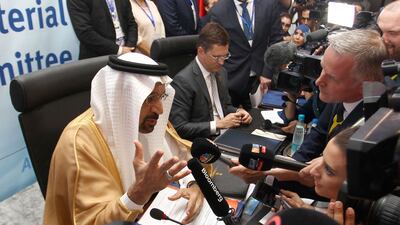Opec and allies have ended day one of their joint ministerial monitoring committee meeting in Algiers with no significant pledge to boost output.
The move to stay the course adopted by de facto Opec leaders Saudi Arabia and the UAE, which currently holds presidency of the exporters’ group, may come as a snub to US President Donald Trump. He tweeted ahead of the meeting that the producers were maintaining prices artificially high.
“I do not influence prices,” Saudi Oil Minister Khalid Al Falih said in the Algerian capital, adding that the market had been “adequately supplied”.
“I don’t know of any refiner in the world who is looking for oil and is not able to get it,” he said.
The meeting at Algiers comes amid a steady climb in the price of benchmark Brent, which is close to breaching the $80 per barrel mark after having averaged $72 per barrel for much of the year. The convening of Opec and producers outside of the group led by Russia, which is a co-head of the monitoring committee, is tense following threats by Iran to veto decisions to allot supply quotas.
Tehran is desperately selling its oil to the market at a time of increasing squeeze by the White House, which has indicated November 4 as the deadline for Iran’s buyers to reduce their imports to zero.
A flood in the market, which was Opec and its allies’ worst nightmare, is undesirable for Iran as it will lead to an even lower price for its exports, particularly when approximately 1.5 million of its barrels are expected to drift away from the market.
Giovanni Staunovo, commodity analyst at UBS said the cartel and its allies, known as Opec-plus, will unlikely mention any specific production increase in numbers on Monday.
“Considering the August over-compliance of 129 per cent, that compliance level already allows a higher production over the coming months,” he said.
_______
Read more:
Iran unlikely to find support within Opec+ as it opposes group policy
Iran threatens Opec on decisions it says hurt its interests
Trade wars and falling Iran exports to impact supply and demand, says Opec
________
“Still, I remain sceptical that the press release will mention any production increase number, but it doesn’t exclude that a number is mentioned during the press conference similar to Vienna,” he added.
At the Opec+ Vienna meeting in June, producers reversed an earlier pact to slash production and aimed to restrain output supply to meet 100 per cent compliance with agreed group quota.
Saudi Arabia is the only producer within the group that has the potential to boost production short term. The world’s biggest oil exporter added around 450,000 bpd since the beginning of the year.
The UAE, which accounts for 4.2 per cent of global oil production, said it had significant spare capacity but was not in a hurry to “overuse” it.
"We still have a job to complete which is going to the 100 per cent [compliance],” UAE Energy Minister Suhail Al Mazouei told reporters in Algiers.


